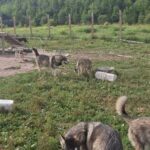As northern frost gives way to spring planting season, the federal government has sown seeds of economic growth with a timely $702,000 investment package aimed at revolutionizing Northern Ontario’s agricultural landscape. The funding, announced yesterday through FedNor, targets critical infrastructure and innovation projects designed to strengthen food security and create sustainable economic opportunities across the region’s expanding agri-food sector.
“This strategic investment represents more than just dollars—it’s about cultivating resilience in northern communities,” said Terry Sheehan, Parliamentary Secretary to the Minister of Labour and Seniors and MP for Sault Ste. Marie, who announced the funding on behalf of Minister Patty Hajdu. “By supporting the agri-food sector, we’re addressing the unique challenges of northern food production while creating valuable jobs and economic diversification.”
The funding package distributes $462,000 to the Rural Agri-Innovation Network (RAIN), a division of the Sault Ste. Marie Innovation Centre. These funds will support a three-year initiative to develop crucial infrastructure and marketing strategies for Northern Ontario’s agri-food sector, with a particular focus on expanding market access for producers across the region.
David Thompson, RAIN’s Research Project Coordinator, emphasized the transformative potential of the investment. “Northern producers face distinct challenges—shorter growing seasons, limited infrastructure, and complex distribution networks. This funding allows us to address these barriers systematically, creating new pathways to market for northern agricultural products,” Thompson told CO24 Business.
An additional $240,000 will flow to Bioenterprise Canada to enhance business development services specifically tailored to Northern Ontario’s agri-food entrepreneurs. This component aims to provide specialized support, mentorship, and knowledge transfer to emerging businesses in the sector.
“The timing couldn’t be more critical,” explains Dr. Marta Ellsworth, agricultural economist at Lakehead University. “With global supply chains facing unprecedented challenges and food security concerns mounting, developing robust regional food systems isn’t just economically beneficial—it’s becoming essential to community resilience.”
The investment aligns with growing consumer interest in locally produced food across Canada, a trend that accelerated during the pandemic and continues to gain momentum. Market analysis indicates that Ontario consumers increasingly prioritize local food products, creating expanded opportunities for northern producers who can overcome logistical challenges.
The economic impact is expected to extend well beyond direct agricultural production. According to FedNor officials, the funding should help create approximately 50 new jobs while maintaining another 120 positions across various communities. Additionally, the investment aims to support at least 75 businesses and promote 110 products or services developed in Northern Ontario.
“What makes this approach particularly promising is its comprehensive focus on the entire value chain,” said Jennifer Smith, CEO of Northern Ontario Farm Innovation Alliance. “We’re not just looking at primary production, but processing, distribution, and marketing—all the critical components needed to build a sustainable regional food system.”
The announcement comes against a backdrop of changing climate conditions that are gradually extending growing seasons in northern regions. While this creates new agricultural possibilities, it also introduces challenges that require innovation and adaptation from producers.
Indigenous communities are expected to play a significant role in the expanding northern agri-food economy. Several First Nations in the region have launched agricultural initiatives that blend traditional knowledge with modern growing techniques—projects that could benefit significantly from the new funding streams.
“We’re seeing tremendous interest from Indigenous communities in developing food sovereignty through agricultural enterprises,” noted Thompson. “These investments will help support those initiatives while creating meaningful economic opportunities.”
As Northern Ontario continues to diversify its traditionally resource-based economy, the agri-food sector represents a promising avenue for sustainable growth. The question now facing producers, communities, and economic developers: can this strategic investment be leveraged to transform Northern Ontario into a recognized and thriving agricultural region despite its geographic and climatic challenges?

























